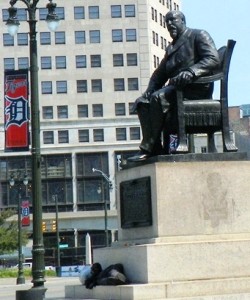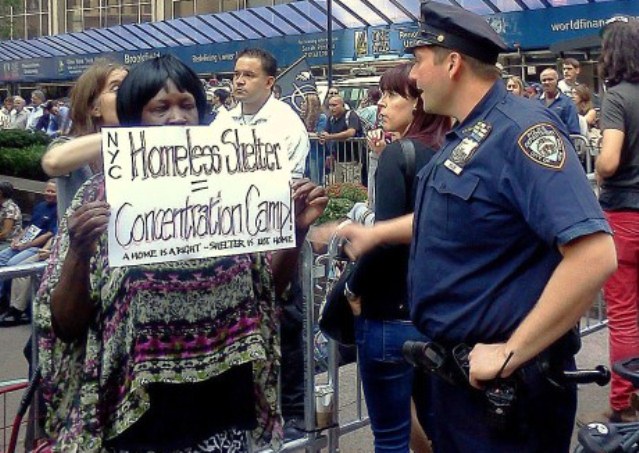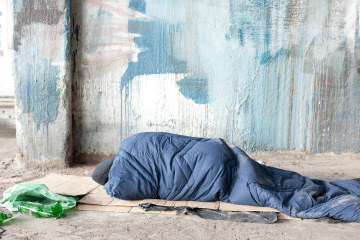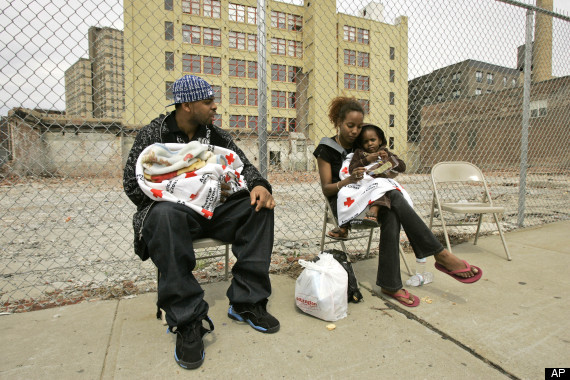The city plans to forcibly segregate them in the same year it celebrates the 50th anniversary of the Civil Rights Movement.
By Jason Notte
MSN Money
August 23, 2013
http://money.msn.com/now/post–columbia-sc-to-exile-its-homeless
What’s the quickest, easiest — if least effective — way to deal with your downtown’s unsightly problem of homelessness? Making it somebody else’s problem.
Because the city government in Columbia, S.C., apparently cribs its planning for homeless outreach from old episodes of “South Park,” it has decided to get its big push broom out of the garage and just sweep the homeless out of the city center.
The Columbia City Council unanimously approved the plan, creating special police patrols that would enforce “quality of life” laws involving loitering, public urination and other crimes not necessarily restricted to the homeless population. Those officers would then offer the homeless a choice: Go to jail for their homelessness or be shuffled to a 240-bed, 24-hour shelter on the outskirts of town, which they wouldn’t be allowed to easily leave.
That second option isn’t jail, mind you, because the homeless are being confined with the help of a local charitable organization. It’s charitable incarceration, you see. The homeless can leave, but they need to set up an appointment and be shuttled by a van.
And just in case any of the offending homeless get any ideas about doing something crazy like, oh, walking into town, officials plan to post an officer — we can only assume it won’t be Brian Dennehy — on the road leading to downtown just to make sure they don’t walk back and go all John Rambo on the place.

Homeless man in Detroit rests at base of Mayor Hazen Pingree statute. The plaque on the statue says Pingree was the first to warn of the dangerous powers of the private corporations.
But, hey, it’s cool: That 240-bed shelter should totally hold the 1,518 homeless people currently living in the Columbia area. Besides, the city is partnering with a charity. Surely they’ll be able to make this exile of the homeless work, right?
Michael Stoops, director of community organizing at the National Coalition for the Homeless, told ThinkProgress, the plan is the “most comprehensive anti-homeless measure” he had ever seen proposed “in any city in the last 30 years.” He added: “Using one massive shelter on the outskirts to house all a city’s homeless is something that has never worked anywhere in the country.”
But there has to be a first time for everything. Maybe this policy doesn’t do anything to make the homeless less homeless. Maybe it doesn’t peek into bigger issues like South Carolina’s 8.1% unemployment rate or Columbia’s 7.9% rate — each higher than the national average. Maybe it doesn’t factor in a state foreclosure rate that ranks among the nation’s Top 10 and far outstrips the national average.
But a city marking the 50th Anniversary of the Civil Rights Movement can’t get into trouble for segregating a whole portion of the population from the rest of the city just because it doesn’t like the way it looks, can it? Well, there is that whole “equal treatment under the law” business that applies whether someone is shaking a change cup outside of a Starbucks or not.
“The underlying design is that they want the homeless not to be visible in downtown Columbia,” Susan Dunn, South Carolina ACLU’s legal director said. “You can shuttle them somewhere or you can go to jail. That’s, in fact, an abuse of power.”
Good luck with that, Columbia.
Tampa Passes New Law To Toss Homeless People In Jail For Sleeping In Public
By Scott Keyes on July 22, 2013 at 11:30 am
http://thinkprogress.org/justice/2013/07/22/2335261/tampa-criminalize-homelessness/
If homeless people in Tampa want to avoid jail, they’d better find a place to store their things and a bed to sleep in.
That’s because last week, the Tampa City Council passed a new ordinance, Item #60, allowing police officers to arrest someone they see sleeping in public or “storing personal property in public.” The vote was 4-3.
Advocates are outraged over this new law criminalizing homelessness. Holding signs reading “Sleeping Is Not A Crime” and “Homelessness Is Not A Choice,” many demonstrated outside the Council and testified against the measure, to little avail. A number of the protesters were elementary school children who handed out flyers and asked those passing by, “Where are they supposed to go?”
Homelessness is a major, pervasive issue in Tampa. A 2012 study found that, among mid-sized cities, Tampa and the surrounding area had the highest number of homeless individuals at 7,419.
Exacerbating the problem is the lack of affordable homeless shelters, much less affordable permanent housing. “Most shelters in the Tampa Bay area charge $10 to $42 per night for a single person. They aren’t free,” Tasha Rennels, a Ph.D. student at University of South Florida, told Bay News 9. Though the City Council acknowledged that shelters in the city are full almost every night, they didn’t include any additional funding for new shelters or housing to go along with Item #60.
Tampa isn’t the only city taking on new anti-homeless measures. Last week, a Miami City Commissioner began an effort to throw homeless people in jail who were caught engaging in life-sustaining activities in public, such as eating and sleeping.








